Ukrainian music covers diverse and multiple component elements of the music that is found in the Western and Eastern musical civilization. It also has a very strong indigenous Slavic and Christian uniqueness whose elements were used among the areas that surround modern Ukraine.
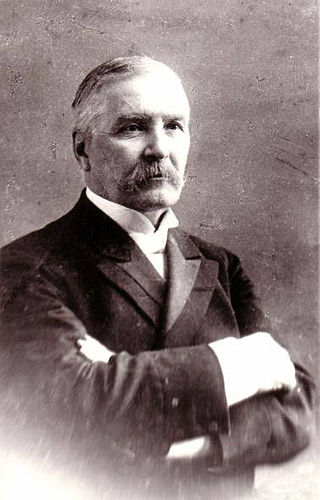
Mykola Vitaliiovych Lysenko was a Ukrainian composer, pianist, conductor and ethnomusicologist of the late Romantic period. In his time he was the central figure of Ukrainian music, with an oeuvre that includes operas, art songs, choral works, orchestral and chamber pieces, and a wide variety of solo piano music. He is often credited with founding a national music tradition during the Ukrainian national revival, in the vein of contemporaries such as Grieg in Norway, The Five in Russia as well as Smetana and Dvořák in what is now the Czech Republic.
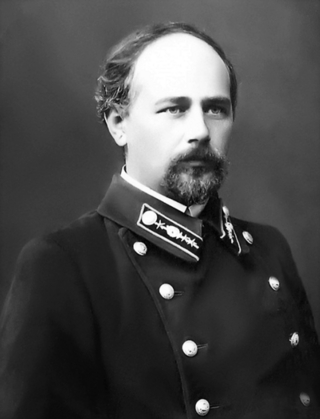
Mykola Dmytrovych Leontovych was a Ukrainian composer, conductor, ethnomusicologist, and teacher. His music was inspired by the Ukrainian composer Mykola Lysenko and the Ukrainian National Music School. Leontovych specialised in a cappella choral music, ranging from original compositions to church music to elaborate arrangements of folk music.
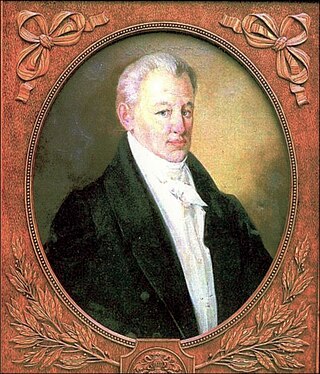
Ivan Petrovych Kotliarevsky was a Ukrainian writer, poet and playwright, social activist, regarded as the pioneer of modern Ukrainian literature. Kotliarevsky was a veteran of the Russo-Turkish War.
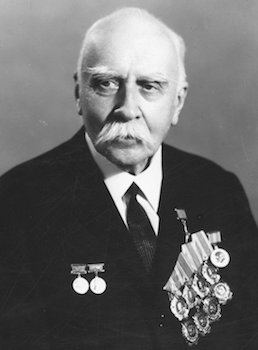
Levko Mykolaiovych Revutsky was a Soviet and Ukrainian composer, pedagogue, and public figure.

Fyodor Ignatyevich Stravinsky, 20 June [O.S. 8 June] 1843, estate Novy Dvor (Aleksichi), Rechitsky Uyezd, Minsk Governorate – 4 December [O.S. 21 November] 1902) was a Russian bass opera singer and actor. He was the father of Igor Stravinsky and the grandfather of Théodore Strawinsky and Soulima Stravinsky.
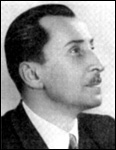
Pavlo Pavlovych Virsky, PAU, was a Soviet and Ukrainian dancer, ballet master, choreographer, and founder of the Pavlo Virsky Ukrainian National Folk Dance Ensemble, whose work in Ukrainian dance was groundbreaking and influenced generations of dancers.

Vasyl Kyrylovych Avramenko was a Ukrainian actor, dancer, choreographer, balletmaster, director, and film producer, credited with spreading Ukrainian folk dance across the world. Colourful, energetic, imaginative, and, quite often exasperating, he was an impresario greatly reminiscent of The Music Man. For his unparalleled missionary zeal and his love of Ukrainian culture, he is considered by many to be the "Father of Ukrainian Dance".

Ivan Semyonovich Kozlovsky ; also referred to as Kozlovskiy or Kozlovskij; 24 March [O.S. 11 March] 1900 – 21 December 1993) was a Soviet lyric tenor and one of the most well known stars of Russian opera, as well a producer and director of his own opera company, and longtime teacher at the Moscow Conservatory. People's Artist of the USSR (1940) and Hero of Socialist Labour (1980). According to Steven Kotkin, he was Joseph Stalin's favorite singer.

Natalka Poltavka is a Ukrainian play written by Ivan Kotliarevsky.
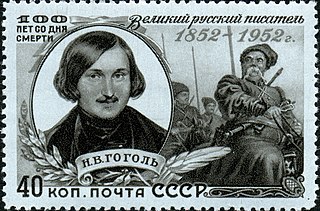
Taras Bulba is an opera in four acts by the Ukrainian composer Mykola Lysenko. The libretto was written for Lysenko by his cousin, the playwright Mykhailo Starytsky, and is based on the novella Taras Bulba, written by the Russian novelist Nikolai Gogol, himself of Ukrainian origin. The story is about a Cossack who discovers his son has betrayed his people, and kills him.
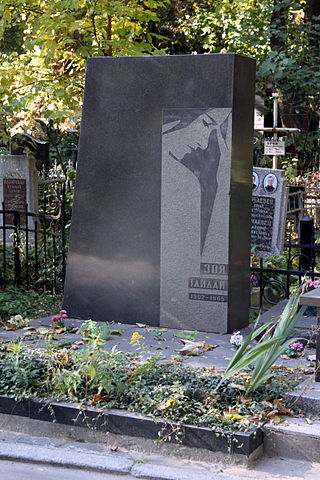
Zoia Mikhailovna Gaidai was a Soviet and Ukrainian opera soprano. She was an artist of wide creativity, with a bright vocal range and talent who staged more than 50 musicals of the works of Ukrainian and Russian composers, as well as works of the classical repertoire of Western European composers. She kept close contact with other composers of her time, such as Mykola Lysenko, Boris Lyatoshynsky, Viktor Kosenko, and Levko Revutsky.

Maria Kostiantynivna Adasovska, better known under her pseudonym Maria Zankovetska ; 4 August 1854 – 4 October 1934) was a Ukrainian theater actress. There are some sources that date her birth to 3 August 1860.

Irena Turkevycz-Martynec was born in Brody, Kingdom of Galicia and Lodomeria, and came to Canada, to Winnipeg, in 1949. She was a Prima donna in the Lviv Theatre of Opera and Ballet, and performed in Paris, Vienna, Berlin, Prague, and many other European cities during her long and storied career.

The Mykola Lysenko House-Museum is one of the museums of outstanding figures of Ukrainian culture in Kyiv. It is located in the house of the teacher Mykola Gvozdik, where the Ukrainian composer Mykola Lysenko rented the 2nd floor from August 1894 to November 1912.
Maria Zinovievna Hrebinetska was a Ukrainian-American theater actress and singer (soprano). She is known for her performances at the Mykola Sadovsky Theater, Odesa Opera House, and the Ruska Besida Theater in Lviv.

A national school of opera in Ukraine first emerged during the last third of the 19th century, and was based on the traditions of European theatre and Ukrainian folk music. The first opera by a Ukrainian composer was Maxim Berezovsky's Demofont, based on an Italian libretto, which premiered in 1773. The oldest opera in the Ukrainian musical repertoire, A Zaporozhye Cossack on the Danube by Semen Hulak-Artemovsky, was written in 1863. The composer Mykola Lysenko, the founder of Ukrainian opera, composed a number of works, including Natalka Poltavka, Taras Bulba, Nocturne, and two operas for children, Koza-dereza and Mr Kotsky.
Mariia Yuryivna Stefiuk is a Ukrainian opera singer and music teacher who has been associated with the National Opera of Ukraine and the Petro Tchaikovsky National Music Academy of Ukraine. She began her career as a trainee singer at the Kyiv Opera and Ballet Theater in 1972, after being accepted into the institution's troupe before being made a soloist two years later. Stefiuk has recorded her works on physical media and has educated in the department of solo singing at the Petro Tchaikovsky National Music Academy of Ukraine since 2000. She has been appointed to the Order of Princess Olga, been made a People's Artist of Ukraine, a People's Artist of the USSR, and received each of the Lenin Komsomol Prize, the Shevchenko National Prize, the Honorary Diploma of the Cabinet of Ministers of Ukraine and the Order of Friendship. Stefiuk was conferred the title of Hero of Ukraine with the Order of the State in 2008.
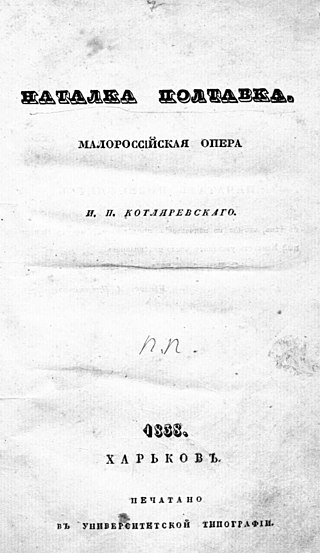
For the opera, see Natalka Poltavka (opera): For Ivan Kotlyarevsky's play, see Natalka Poltavka.


















